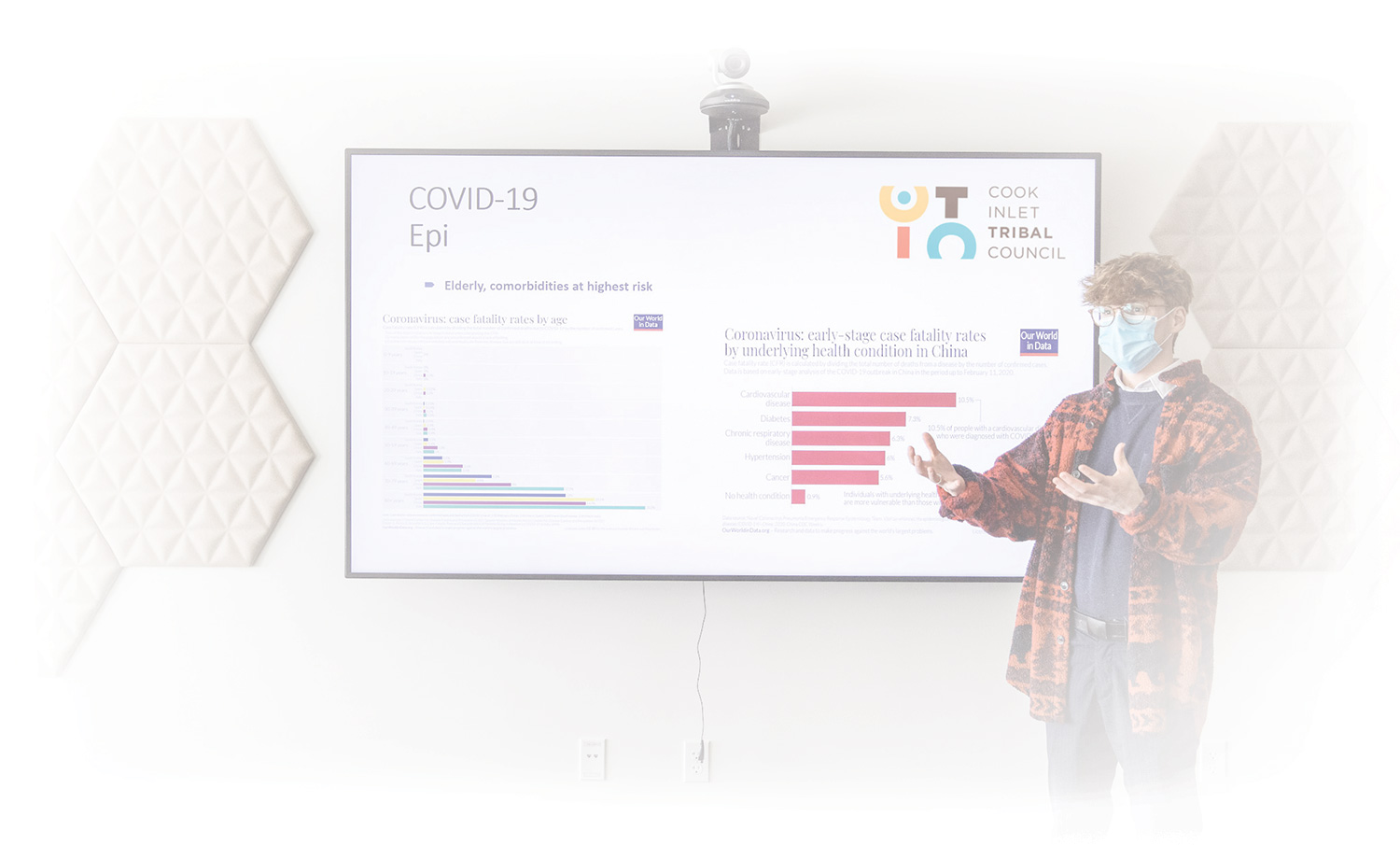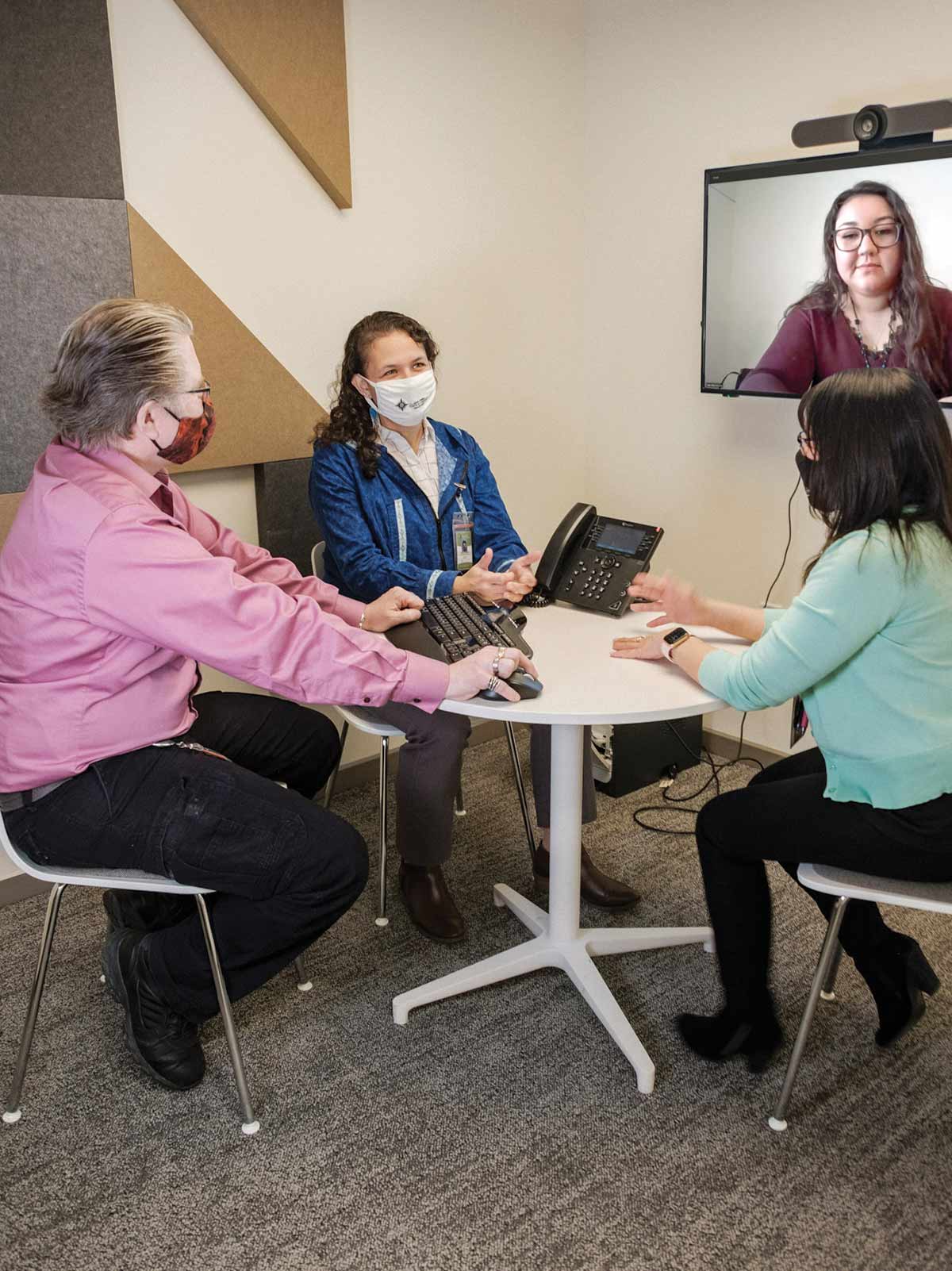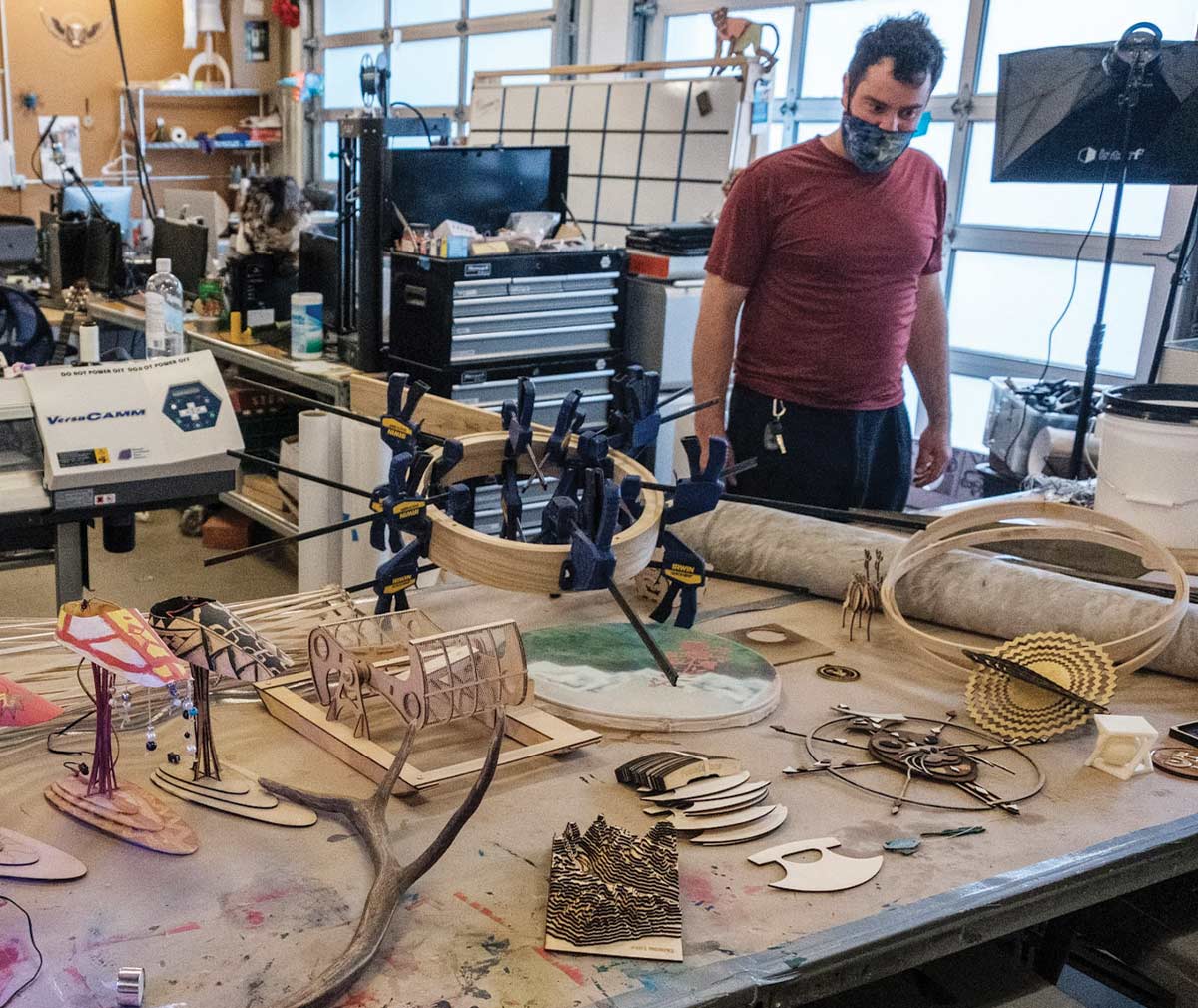
ook Inlet Tribal Council (CITC) is all about people: its employees, its clients, its community. So it’s no surprise that the organization was recognized by our readers in our annual July Best of Alaska Business (BOAB) awards in two categories: Best Place to Work 250+ Employees and Best COVID-19 Response.
According to one BOAB survey respondent, “CITC remained open for services throughout the pandemic as a critical service for some of Anchorage’s most in-need people. They staggered appointments with on-site presence as needed and used all of the available technology to keep operations fluid… CITC was hit hard by both the earthquake and the pandemic; however, their value of resilience really shined through for their employees.” Many, many others wrote in as part of the BOAB survey process to report how CITC puts people first every day—and in any crisis.
This directly exemplifies CITC’s mission, which is “To work in partnership with our people to develop opportunities that fulfill our endless potential.” CITC is a large organization with a wide array of services that it provides to people throughout the community.
The nature of the nonprofit’s mission connects it with people during times of transition or crisis, as it provides child and family services, youth empowerment services, employment and training, leadership and workforce development, and substance misuse recovery services.
CITC has five core values that guide decision-making as it develops and implements programs and partnerships: being interdependent, resilient, accountable, respectful, and humorous. “One of our newest values that we’ve added is humor,” says President and CEO Gloria O’Neill. “We walk alongside our participants, and many days we see stories of both challenge and triumph. In some of that challenge, we need humor: How do we take moments to have humor, sometimes, in the most serious conversations that we may have with people?”
For the last half decade in Alaska, a sense of humor has been vital for everyone as the state has worked through a recession, a massive earthquake, and a global pandemic. Compared to the unexpectedness, novelty, and global scope of the pandemic, in retrospect the November 2018 earthquake in Southcentral feels almost commonplace. And for many, they fortunately saw little damage or disruption to their lives outside of the short-term shock and the need to share “Where I was” stories for a few months.
But for CITC the earthquake had a much more significant effect. “We knew within an hour of that earthquake that we would not be able to inhabit our building,” says O’Neill. A December 2018 CITC release stated: “Initial assessments reveal the building is structurally sound but severely damaged and currently deemed unsafe for public traffic.”
O’Neill recalls, “Immediately, we had to think about moving our 250 employees out of our home, find space, set up the accounting department so we could get employees their paychecks the following week—and we had TANF [Temporary Assistance for Needy Families] benefits that had to be paid within 48 hours. We had to take care of people who relied on us for their basic needs in addition to all of our other programs.”
It was “a huge lift,” she says, to move 250 employees to new locations (along with office equipment, furniture, or supplies), which CITC accomplished within approximately three weeks to once again be fully operational.
“We created the technology that was needed to connect with people, like phone trees that let us connect with participants. We had to strategically organize because our 250 employees went to different locations throughout Anchorage,” O’Neill says.
It wasn’t until December 2019 that CITC was able to start up operations in its building. “Flash forward to early March—a pandemic!” O’Neill laughs. “We said: Ok. Let’s take a deep breath, but we can do this, we have the ability to move quickly.”
The COVID-19 crisis loomed for some time before crashing down on Alaska, but even with some notice, it was impossible to anticipate the challenges it would deliver. But for CITC, the question wasn’t if to continue services, but how. “We decided right away, being a critical infrastructure organization, that we needed to keep our doors open,” O’Neill reports. “We serve people in crisis and the most vulnerable, and not everybody has access to technology or even to a phone to call us.”
Instead of building barriers between employees and clients, CITC immediately focused on how to operate safely while retaining communication and relationships. “We moved quickly to put safety protocols in place.” Within two weeks, cleaning processes were established, and personnel that could be transitioned to work away from the building were working from home offices.
However, because of the nature of the services CITC provides, not everyone could work from home. “What leadership said,” O’Neill explains, “is, if we’re going to ask some of our frontline staff to show up and provide that direct service to people who have no other means of connecting with us, leadership is going to show up.” The leadership team at CITC determined to work from the building along with frontline staff.
“We weren’t afraid, we just weren’t afraid,” she says. “We’re called to this mission, this mission is in our heart, and this is when we do our best work, in crisis. We learned that through the earthquake, and we learned that through COVID.”
Cook Inlet Tribal Council

Cook Inlet Tribal Council
Cook Inlet Tribal Council

Cook Inlet Tribal Council
According to CITC Chief Operating Officer LeeAnn Garrick, the organization’s pandemic response involved “small things and big things” to meet the needs of the people it serves. “We made sure that somebody was here to answer calls; we had our mail drop open; we made sure forms were available for folks; we didn’t miss any general assistance payments, childcare payments, or any of those things; we communicated back out to our participants to make sure they knew, ‘The rest of the world is sort of on fire, but we’ve got you.’ We did a lot of outreach with our participants to make sure that they were okay… we made sure that our elders who were alone had a way to connect with us and had what they needed.”
CITC scheduled two large food drops at the Clare Swan Early Learning Center where people could drive up and “we filled the back of their vehicles with food,” Garrick says. The nonprofit followed that up with a recipe and online cooking show to help those who were perhaps unused to cooking at home or just needed fresh ideas.
CITC also made sure to have a presence at the congregate shelter established at the Sullivan Arena. “We went down there and realized, ‘This is right where we need to be.’” CITC made sure to be there, helping people find employment or temporary housing. “We worked really close with the Muni[cipality of Anchorage] on some rapid rehousing work for about fourteen months,” Garrick recalls. They had employees on site that could help people get IDs or related documentation, and CITC also placed its recovery team on site to help anyone struggling with addiction.
Last summer, CITC launched even more programs and services to address the shifting conditions of the pandemic. “We did over 8,000 hours of tutoring for students, both virtual and in-person,” Garrick says. “Some students don’t have families where the structure’s really stable, so we offered to have them come in—everybody’s wearing a mask, and distanced, and all those sorts of things—but it was important to us to make sure those students had someone to help them with their homework, that they got a snack… There were several that had situations going on in their family around the pandemic in unemployment, family violence, things like that, that it was really important to us to make sure that they had a safe place to go.”
O’Neill adds, “When the vaccines came out, we did an amazing amount of education: we hired a COVID-19 public health manager, and his only job was to do that. We brought mobile vaccination clinics on-site, and we worked with SCF [Southcentral Foundation] to provide our non-Native staff the opportunity to get vaccinated.”
According to Chief Administrative Officer Tabetha Toloff, some pandemic-inspired programs and initiatives will live on at CITC after the pandemic has been put to rest. For example, “One of the things that we did—that we’re going to keep doing—was we acquired a virtual job fair platform,” she says. “We hosted several citywide job fairs throughout the year and successfully connected a number of people to new careers.” Across industries, finding qualified employees is a major concern, and job fairs like CITC’s benefit employees and employers alike. “We’re keeping abreast of the different trends related to recruitment, employee development, and retention across the State of Alaska and the Lower 48. We are experiencing the same workforce challenges that other organizations are,” Toloff says.
Throughout the pandemic, CITC also launched programs and initiatives specifically to support its own staff. “When school started up, we had a lot of employees who were struggling to juggle work and helping their kids with the schools’ online system,” Toloff says. “With LeeAnn’s team, we set up computer labs with onsite tutors, and employees were able to bring their school-aged children to work.
“They were very structured tutoring sessions,” she continues. “So employees could actually come to work knowing that their kids were in a safe place and being productive.”
O’Neill, recognizing the mental toll that the pandemic was taking on everyone, gave every employee, including those working remote from home, a thirty-minute wellness break during the day to get up and move about, reset, or get fresh air. “I really encouraged staff to be mindful about their mental health and created support for our staff whenever they needed that,” she says.
CITC’s attention to their employees’ needs has been heightened over the last two years as the pandemic has added pressures across the board, but their quest to support their people began long before the first news of a novel coronavirus.
Cook Inlet Tribal Council

Cook Inlet Tribal Council
Cook Inlet Tribal Council

Cook Inlet Tribal Council
Toloff says more than five years ago CITC was rewriting its sustainability plan with a “huge focus” on employees. “We focused on work-life balance, training and development, and compensation and benefits,” she says. “One of the things we did was extend a four-week paid sabbatical to employees after five years of service.”
In many ways CITC’s mission is to care, and it’s important for employees to feel that mission in order to convey that caring on to the people they serve.
So how does the organization make sure every employee feels—and participates in—that culture of care? According to O’Neill, it’s through “transparency and communication: communicating to our employees how much we value their connection to the mission, their heart, their passion, their dedication, and overall commitment to what they do.”
The people-first approach at CITC is found in the company’s leadership, including the board. “Our board is amazing,” O’Neill says. “The tribal leadership on our board is very thoughtful, they’re forward thinking, they’re extremely supportive, and that was important to how we were able to respond to both the earthquake and COVID.”
She’s also proud of CITC’s employees, which she describes as “an incredible team of dedicated staff.”
“I’m proud that, when COVID was first named a pandemic, as one of our first priorities, we raised money for a participant emergency fund for people who had nothing,” O’Neill says. “We didn’t know what federal or local government support might look like, so we raised money from our partners across the community to be there for our people.”
Even as the pandemic continues to create unanticipated circumstances month after month, O’Neill is confident in her team and hopeful for Alaska’s future.
“Our mission is all about the potential of people; we are glass-is-half-full people,” she laughs. “I was reminded today, as things are shifting so rapidly, that we need to continue to listen, both with an open mind and an open heart, and not feel like we have to have all the answers. What we have to do is stand solidly in our mission.” ![]()